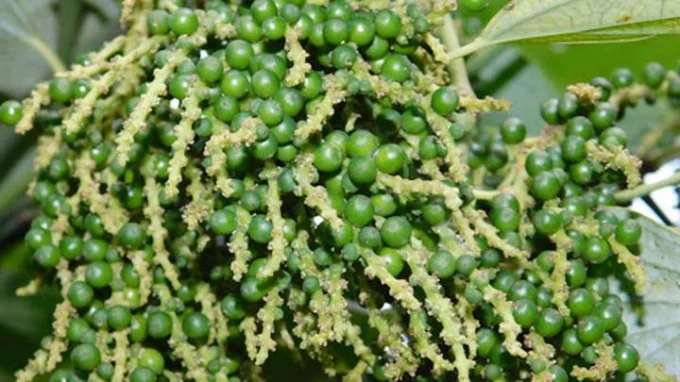November 26, 2025 | 22:24 GMT +7
November 26, 2025 | 22:24 GMT +7
Hotline: 0913.378.918
November 26, 2025 | 22:24 GMT +7
Hotline: 0913.378.918

Latest domestic and global pepper prices on 07/16/2024
On the global market, the pepper prices on July 16 show a slight decrease in Indonesia but remain unchanged in other countries.
Accordingly, the price of black pepper Lampung in Indonesia decreased by 0.11%, to $ 7,203/ton. Meanwhile, the price of white pepper Muntok in this country decreased by 0.12%, to $ 9,171/ton.
The price of black pepper Kuching ASTA in Malaysia remains at $ 7,500/ton, while white pepper ASTA in this country is priced at $ 8,800/ton.
In the Brazilian market, the price of black pepper ASTA 570 remains at $ 7,150/ton.
In Vietnam, the export price of black pepper of 500 g/l grade is traded at $ 6,000/ton, and the 550 g/l grade is traded at $ 6,600/ton. The export price of white pepper remains at $ 8,800/ton.
World pepper prices today only slightly decreased in Indonesia, while other markets remained steady.
Thus, world pepper prices on 07/16/2024 decreased slightly in Indonesia compared to yesterday.
In the domestic market, pepper prices on July 16 remained unchanged compared to yesterday.
Specifically, Dak Lak continues to purchase pepper at VND 150,000/kg;
Today's pepper price in Dak Nong remains at VND 151,000/kg;
Similarly, today's pepper price in Gia Lai continues to be purchased at VND 150,000/kg;
Traders in Dong Nai are trading pepper at VND 150,000/kg;
The pepper price in Ba Ria - Vung Tau today stays at VND 151,000/kg;
Meanwhile, traders in Binh Phuoc are still trading pepper at VND 150,000/kg.
Domestic pepper prices today are quiet with few transactions. The highest price for this agricultural product is currently at VND 151,000/kg.
Many had hoped that the increased purchasing from China in the third quarter of 2024 would help the market improve, but so far, there are no signs of this. The volume of pepper exported to China remains very low compared to previous years.
Many experts believe that this year's pepper price trends are not following the patterns of previous years. This period is considered a time of supply shortage because Vietnam, which supplies 50% of the world's pepper, finished its harvest in March, while Brazil's harvest has not yet started, and Indonesia and Malaysia's peak harvest period is around July.
Lower supply compared to demand is the reason for the upward trend in pepper prices in all markets, not just in Vietnam. Maintaining the primary global supply in recent months has helped Vietnam's pepper prices rise sharply, even during the harvest season.
Looking at the long term, over the next 3-5 years, the production volume of pepper is unlikely to meet the world's consumption demand. Therefore, Vietnam's pepper industry still has many opportunities to develop and maintain the current growth trend.
Thus, domestic pepper prices on 07/16/2024, are trading around VND 150,000 - 151,000/kg.
$ 1 = VND 25.207 - Source: Vietcombank.
Translated by Hoang Duy
/2025/11/24/3616-2-141832_513.jpg)
(VAN) FSC certification has helped increase the value of thousands of hectares of planted forest timber under the management of the Xuan Loc Protection Forest Management Board, particularly in terms of selling prices.

(VAN) More than 100 shoppers queued for a chance to get a kilo or so of Japanese rice for 500 yen ($3.32) by heaping as much grain into a small wooden box as possible.

(VAN) Benchmark international prices of milled declined in October as harvests started or improved in some parts of the globe.

(VAN) Show cause orders will be issued to retailers who sell imported rice at prices exceeding the maximum suggested retail price (MSRP) of P43 per kilo, Philippines Agriculture Secretary said in a statement on Thursday.

(VAN) Coffee prices on October 20, 2025, remained stable domestically, trading at 113,500–114,500 VND/kg. Similarly, global coffee prices also moved sideways.

(VAN) By October, Vietnam’s coffee exports had surpassed USD 7 billion for the first time and will exceed USD 8 billion within this year.

(VAN) Illinois rancher says Texas, Oklahoma, Kansas lost grass and forage, forcing massive cattle liquidation.